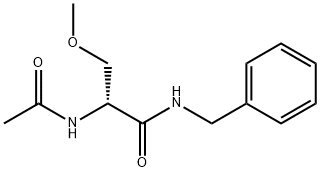Lacosamide (LCM), (SPM 927, (R)-2-acetamido-N-benzyl-3-methoxypropionamide, previously referred to as harkoseride or ADD 234037) is a member of a series of functionalized amino acids that were specifically synthesized as anticonvulsant or antiepileptic drug. It reduces the spread of seizure activity in the brain. Lacosamide appears to have a dual mode of action: selective enhancement of sodium channel inactivation and modulation of collapsin response mediator protein-2. Compared to novel antiepileptic drugs, lacosamide has broader and higher efficacy, better tolerability, and improved pharmacokinetic properties. Lacosamide is in phase III clinical development for adjunctive treatment of patients with uncontrolled partial-onset seizures, and for monotherapy of patients with painful diabetic neuropathy. It is absorbed rapidly and completely after oral administration. Lacosamide has an elimination half-life of approximately 13 hours and a low potential for drug interactions. Additionally, lacosamide exhibits linear, dose-proportional pharmacokinetics with low intra- and interpatient variability.

